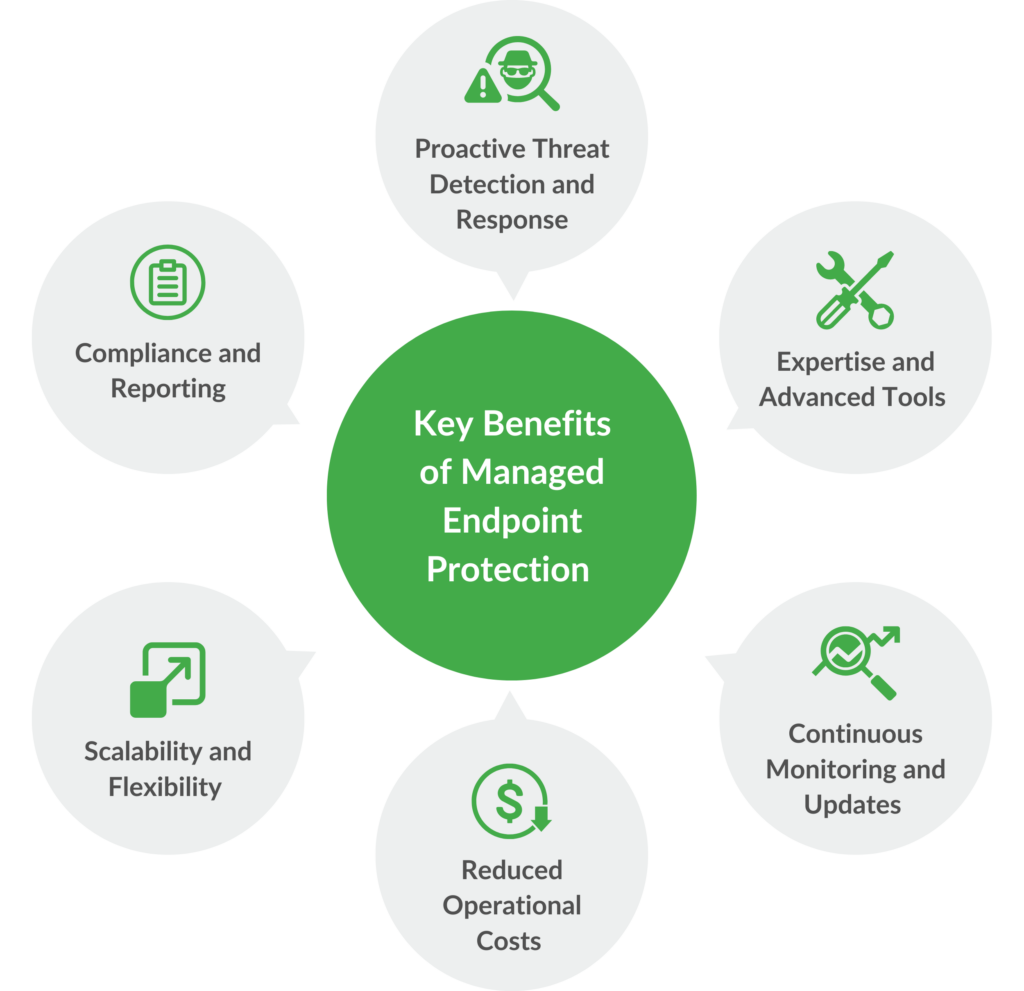Managed Endpoint Protection and Its Advantages for Your Business

Introduction
Cybersecurity threats are evolving rapidly, targeting businesses of all sizes with increasing sophistication. These threats, ranging from malware and ransomware to phishing attacks, pose significant risks to your organization’s data and operations. One essential aspect of a robust cybersecurity strategy is endpoint protection. But what exactly is managed endpoint protection, and why is it crucial for modern businesses?
Managed endpoint protection refers to a comprehensive cybersecurity solution that involves not just deploying security software on individual devices but also actively managing and monitoring those endpoints to ensure their protection. It combines advanced technologies with expert oversight to safeguard all your digital endpoints—be they computers, mobile devices, or IoT devices—from potential threats. In today’s fast-paced digital landscape, prioritizing managed endpoint protection can make the difference between a secure business and a vulnerable one.
Understanding Managed Endpoint Protection
Explanation of Endpoints
Endpoints are any devices that connect to your network, including desktops, laptops, mobile phones, tablets, and IoT devices like smart printers or sensors. Each of these endpoints represents a potential entry point for cyber threats, making endpoint protection a critical component of your overall security strategy.
Endpoint protection involves deploying security measures to defend these devices from various types of attacks. This includes antivirus programs, firewalls, and anti-malware tools designed to prevent, detect, and respond to threats.
What Makes It Managed?
Traditional endpoint protection typically involves installing security software on individual devices and performing updates manually. In contrast, managed endpoint protection takes this a step further by incorporating a third-party service provider that actively monitors and maintains the security of your endpoints.
With managed endpoint protection, a team of cybersecurity professionals handles the complexities of threat detection, response, and system maintenance. This proactive management ensures that your endpoints are always protected with the latest security measures without requiring constant oversight from your internal team.

Key Advantages of Managed Endpoint Protection
1. Proactive Threat Detection and Response
Managed endpoint protection services offer real-time monitoring, allowing for quicker detection and response to potential threats. Unlike traditional methods that might react to security breaches after they occur, managed services proactively identify and address threats before they can cause significant damage. For example, ransomware attacks and zero-day exploits can be mitigated through continuous vigilance and rapid intervention.
2. Expertise and Advanced Tools
By opting for managed endpoint protection, you gain access to a team of cybersecurity experts who use advanced tools and techniques. These professionals stay abreast of the latest threat intelligence and trends, providing a level of expertise and resource investment that might be too costly or complex for an in-house team to manage effectively.
3. Continuous Monitoring and Updates
Managed services provide 24/7 monitoring of all endpoints, ensuring that any emerging threats are promptly addressed. Automatic updates and patches are applied to protect against the latest vulnerabilities, keeping your systems secure without requiring manual intervention.
4. Reduced Operational Costs
Outsourcing endpoint protection can be more cost-effective compared to maintaining an internal team. Managed services reduce the need for investing in expensive security infrastructure and personnel. Additionally, by avoiding breaches and minimizing downtime, businesses can save significantly on potential costs associated with security incidents.
5. Scalability and Flexibility
Managed endpoint protection services can easily scale with your business as it grows. They offer the flexibility to adapt to new threats and changing business needs, ensuring that your security measures evolve alongside your organization.
6. Compliance and Reporting
Meeting industry regulations and compliance standards is crucial for many businesses. Managed services provide comprehensive reporting and documentation necessary for audits and regulatory requirements, helping you maintain compliance effortlessly.
How Managed Endpoint Protection Enhances Business Security
Improving Overall Security Posture
Managed endpoint protection enhances your company’s overall security framework by integrating various security measures into a cohesive strategy. This holistic approach strengthens your defenses and reduces vulnerabilities across all endpoints.
Minimizing Human Error
Human error is a leading cause of security breaches. Managed services help mitigate these risks by implementing stringent security protocols and providing user training. This reduces the likelihood of mistakes that could compromise your security.
Enhancing Incident Response
With managed endpoint protection, incidents are handled more swiftly and effectively. The dedicated team responds to security events with precision, minimizing the impact on your operations and ensuring a quicker recovery.
Ensuring Business Continuity
Maintaining operations during and after security incidents is crucial for business continuity. Managed endpoint protection ensures that your systems remain functional and secure, even in the face of a breach or other disruptions.
Considerations When Choosing a Managed Endpoint Protection Service
Key Features to Look For
When selecting a managed endpoint protection service, look for features such as advanced threat detection, incident response capabilities, and centralized management. These features are essential for maintaining a robust security posture.
Vendor Reputation and Experience
Choose a reputable and experienced service provider with a proven track record in endpoint protection. Their expertise and reliability will be crucial in ensuring the effectiveness of your security measures.
Customization and Service Level Agreements (SLAs)
Ensure that the managed service provider offers customizable solutions and clear SLAs to meet your specific business needs. Customization allows the service to align with your unique security requirements and operational goals.
Conclusion
Summary of Key Points
Managed endpoint protection is a vital component of a comprehensive cybersecurity strategy, offering numerous benefits to businesses of all sizes. By leveraging the expertise, advanced tools, and proactive management provided by a managed service, you can enhance your security posture, reduce operational costs, and ensure business continuity.
Assess your current endpoint protection measures and consider how managed services could bolster your security efforts. For personalized advice and to explore managed endpoint protection solutions, don’t hesitate to contact us for a discovery discussion.
Explore more on:





